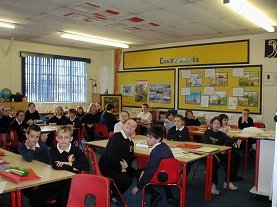Introduction | Who we are | Peer to peer| Activities | Project Findings
To collect data to create and analyse graphs. Compare graphs with those generated by schools in other countries.
Aim | Pupil Age | Curriculum | Activity | Plenary
"You can find out about what people do in different countries"
Pupil age 10, UK
"We do some (MS) Excel work, teaching them how to do graphs using
the wizard to produce the graphs and then we put callouts on to interpret
the graphs. I find this useful; because when pupils do a pencil and paper
graph, it takes them forever to get it laid out right and they've had no time
to interpret it. With Excel they put the data in and within a second they
have a graph and they are starting to interpret it, once they have the ICT
skills of course."
Teacher, UK
Aim: To collect data to create and analyse graphs. Compare graphs with those generated by schools in other countries.
Pupil age: 8 to 11 years / small group activity.
Curriculum: Maths, Geography, Science
Activity: Take a topic for investigation that pupils can collect data on: for example, pupils' height, pupils' hair/eye colour, fuels used in the home, favourite pop stars. Pupils could take different topics, or could take the same topic and survey different classes.
Pupils create a tally chart for the whole class for each topic.
Pupils create a spreadsheet to display the results.
Then pupils create graphs and discuss which graph best illustrates the results.
Also pupils e-mail other schools, explaining exactly how you collected the data and ask them to send you their data, either raw, or as graphs.
Plenary: Compare and contrast the different types of graphs generated (pie chart, bar chart etc.). Compare the results from different countries.
The pupils use ICT to rapidly generate graphs in order to analyse the data and compare the usefulness of a variety of graphs to illustrate different types of data. Pupils then use graphs to compare similar data from different sources. For example; comparison of the types of fuel used in different countries. This promotes discussion about different fuel sources. In particular, where more renewable fuels are used.
[Back]


